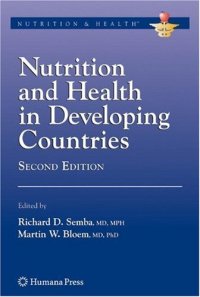
Ebook: Nutrition and Health in Developing Countries
Author: Richard D. Semba (auth.) Richard D. Semba MD MPH Martin W. Bloem MD PhD Peter Piot MD PhD (eds.)
- Tags: Clinical Nutrition, Nutrition, Medicine/Public Health general, Regional and Cultural Studies, International Economics
- Series: Nutrition and Health Series
- Year: 2008
- Publisher: Humana Press
- Edition: 2
- Language: English
- pdf
Nutrition and Health in Developing Countries, Second Edition was written with the underlying conviction that global health and nutrition problems can only be solved through a firm understanding of the different levels of causality and the interactions between the various determinants. This volume provides policy makers, nutritionists, students, scientists, and professionals with the most recent and up-to-date knowledge regarding major health and nutritional problems in developing countries. This greatly expanded second edition has new chapters relevant to humanitarian emergencies, including a case study of the Indian Ocean tsunami in 2004, food in humanitarian relief, food policy, the emerging role of supermarkets in developing countries, homestead food production, aging, ethics, and the adverse impact of parental tobacco use on child health in poor families. These new chapters reflect the increasing complexity and changes that are occurring in developing countries. Nutrition and Health in Developing Countries, Second Edition, brings together a group of authors who come from diverse backgrounds of clinical nutrition, medicine, immunology, infectious disease, epidemiology, public health nutrition, anthropology, health policy, economics, and disaster planning. This book will stimulate further thought, comprehensive and effective policies and programs, and research across disciplines in the goal of improving health and nutrition in developing countries in order to reach the Millennium Goals by the year 2015.
Nutrition and Health in Developing Countries, Second Edition was written with the underlying conviction that global health and nutrition problems can only be solved through a firm understanding of the different levels of causality and the interactions between the various determinants. This volume provides policy makers, nutritionists, students, scientists, and professionals with the most recent and up-to-date knowledge regarding major health and nutritional problems in developing countries. This greatly expanded second edition has new chapters relevant to humanitarian emergencies, including a case study of the Indian Ocean tsunami in 2004, food in humanitarian relief, food policy, the emerging role of supermarkets in developing countries, homestead food production, aging, ethics, and the adverse impact of parental tobacco use on child health in poor families. These new chapters reflect the increasing complexity and changes that are occurring in developing countries.